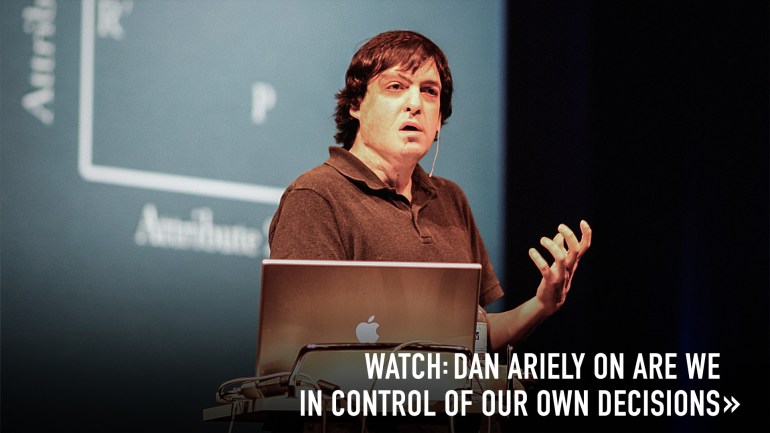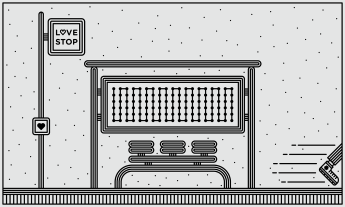
Most people’s hearts leap up when they see the words “50% off” or “Buy One Get One Free.” Unfortunately, discounts cause us to act quickly and spend more than we should, say economist Dan Ariely and writer Jeff Kreisler.
Susan Thompkins is somebody’s Aunt Susan, and everyone has someone like her. Aunt Susan is a genuinely happy and loving woman, who buys gifts for her nephews and nieces whenever she shops for herself and her kids. Aunt Susan loves shopping at JCPenney. She’s been shopping there since she was a child, going with her parents and grandparents, helping them spot bargains. It was a fun game, running around, looking for the highest number next to the percent symbol.
Then, one day, Ron Johnson, JCPenney’s new CEO, got rid of all of the deals. He instituted what he called “fair and square” pricing. Suddenly Susan was sad. Then she was angry. Then she stopped going to JCPenney entirely. She even formed an online group with her friends called “I hate Ron Johnson.”
She wasn’t alone. Many customers left JCPenney. It was a bad time for the company. It was a bad time for Susan. It was a bad time for Ron Johnson, who was fired.
A year later, Aunt Susan heard discounts had returned to JCPenney. Cautiously, she returned and she looked at the prices. “20% off.” “Marked down.” “For sale.” She bought just a couple of things, but since then, she’s returned to her old JCPenney self. She’s happy again.
The CEO made the prices “fair and square.” No more coupons or sales — just the real price, roughly equal to their previous “final” prices. Customers hated it.
In the decades before Ron Johnson’s arrival, JCPenney offered customers coupons, deals and in-store discounts. These reduced Penney’s “regular prices,” which were artificially inflated, to appear to be “bargain deals” — but in fact after the discounts their prices were in line with prices everywhere else. In order to get to the final, retail price of an item, customers and the store would perform this Kabuki theater of raising prices at first and then lowering them in all kinds of creative ways.
Then Ron Johnson made the store’s prices “fair and square.” No more coupon cutting, bargain hunting, and sale gimmicks. Just the real price, roughly equal to those of its rivals and roughly equal to their previous “final” prices. Johnson believed his new practice was clearer, more respectful, and less manipulative (and he was right).
Except that loyal customers like Aunt Susan hated it. Within a year, JCPenney lost an amazing $985 million and Johnson was out of a job. Almost immediately after his firing, the list price of most items at JCPenney rose by 60 percent or more.
This story shows some of the many effects of relativity, one of the most powerful forces that make us assess value in ways that have little to do with actual value. At JCPenney, Aunt Susan assessed value based upon relative value, but relative to what? Relative to the original posted price.
Which would you buy? A dress shirt priced at $60 or the very same dress shirt, priced at $100, but “On Sale! 40% off! Only $60!”? It shouldn’t matter, right? But since relativity works on us at a very deep way, we don’t see these two shirts in the same way, and if we were Aunt Susan, we would buy the on-sale shirt every time — and be outraged by the presence of the $60 one.
Is this behavior logical? No. Does it make sense once you understand relativity? Yes. Does it happen frequently? Yes.
If a bottle of expensive shampoo is $16 and one twice the size is $25, the larger bottle looks like a great deal, making it easy to forget whether we need that much.
We often cannot measure the value of goods and services on their own. In a vacuum, how could we figure the cost of a house or a sandwich, medical care or an Albanian three-toed blork? The difficulty of figuring out how to value things correctly makes us seek alternative ways to measure value. That’s where relativity comes in.
When it is hard to measure directly the value of something, we compare it to other things, like a competing product or other versions of the same product. When we compare items, we create relative values. Now the problem isn’t with the concept of relativity itself, but with the way we apply it. If we compared everything to all other things, we’d consider our opportunity costs and all would be well. But we don’t. We compare the item to only one other (sometimes two). This is when relativity can fool us.
Sixty dollars is relatively cheap compared to $100, but we should be comparing $60 to $0, or to all of the other things we could buy with $60. But we don’t. We use relative value to compare the current price of an item to the amount it used to cost before the sale (or was said to cost) as a way to determine its value. This is how relativity confounds us.
There are many ways in which we let relative value obscure real value. In a car dealership, we get offered add-ons like leather seats and sunroofs, tire insurance, undercoating and CD changers. Car dealers know when we’re spending $25,000, additional purchases, like a $200 CD changer, seem cheap in comparison. Would we ever buy a $200 CD changer? No. But at 0.8 percent of the total purchase price, we hardly shrug. Those hardly-shrugs can add up quickly.
Another place we see this is with quantity discounts. If a bottle of expensive shampoo is $16 and one twice the size is $25, the larger bottle looks like a great deal, making it easy to forget the question of whether we need that much — or that brand of shampoo in the first place. Moreover, bulk discounting also hides the fact we have no clue how to value the cocktail of chemicals that make up shampoo.
Discounts dumb down our decision-making process. When an item is “on sale,” we act more quickly and with less thought than if the product is not on sale.
You might look at those examples and think, “Okay, I understand how using relativity is a mistake. Buuuuuuut . . . those choices make sense because, as a percentage of what I’m spending, the extra expenditures are tiny.” Yes, but a dollar should be a dollar, no matter what else we’re spending or doing. Spending $200 on a CD player just because we happen to be buying a $25,000 car is the same irrelevant reasoning as spending $200 on a CD player just because we happen to be wearing a plaid shirt. It just doesn’t feel as irrelevant.
Relativity is built on two sets of decision shortcuts. First, when we can’t assess absolute value, we use comparisons. Second, we tend to choose the easy comparison. Aylin Aydinli, Marco Bertini and Anja Lambrecht studied relativity by looking at email sales such as Groupon offers and found they create a particularly telling emotional impact. When we encounter price promotions, we spend less time considering different options. Furthermore, if we are later asked to recall details of the offer, we recall less product information.
Discounts, it seems, are a potion for stupidity. They dumb down our decision-making process. When an item is “on sale,” we act more quickly and with even less thought than if the product costs the same but is marked at a regular price. Basically, since it is so hard for us to assess the real value of almost anything, when something is on sale — when we are presented with a relative valuation — we take the easy way out and make our decision based upon that sale price.
Bundles create more confusion. If three fast-food items are each priced at $5 but together are $12, which is overvalued at $5? Which do we get on discount?
Relativity also affects our value assessments when products are bundled — when products offer multiple features and options. In these situations, relativity seems to offer an escape from complexity. However, it actually creates the opportunity for another type of problem and more confusion.
Consider fast-food “value meals.” We could order two separate items, but why not get them together and throw in a third for a few pennies more? Want a hamburger and a soda? Why not add fries? Bundling traps us because we don’t know where exactly to place value. When we face a bundle, we cannot easily value each of the individual components, because if we remove one item it changes the whole price structure. If three items are each priced at $5, but bundled together are $12, which is the one that’s overvalued at $5? Which one is the one we get on discount? Or are we getting a deal on all three? How much is a soda worth, at what size? Oh, I’ll just take number one!
Life is full of bundles, many of which seem designed to confuse us. Think about cell phones. It’s virtually impossible to compare a phone and its unique service plan to competitors’ phones and plans. Each individual item is hard to value on its own: What are text messages worth compared to gigabytes of data? 4G networks, overage charges, minutes, roaming, storage, global access . . . what are they worth? What about the service and fees and reputation of the provider? There are too many small elements to assess the relative value of each one, so we end up comparing the total cost of the phone and monthly service. If we can even figure those out.
Happiness too often seems less a reflection of our actual happiness and more a reflection of how we compare ourselves to others, a comparison that is neither healthy nor good.
The list of things affected by relativity extends beyond products like cell phones. Relativity affects our sense of self-worth, too. We have friends who attended some of the best schools in the country. Some of these friends are doing very well but they think of themselves only in comparison to their more “successful” top-tier colleagues — and thus frequently feel like they aren’t doing well.
It’s one thing to overspend on a car; it’s quite another to lament our life choices. Happiness too often seems less a reflection of our actual happiness and more a reflection of the ways in which we compare ourselves to others. In most cases, that comparison is neither healthy nor good. In fact, our tendency to compare ourselves to others is so pronounced that we had to come up with a commandment not to covet thy neighbor’s stuff.
In some ways, the concept of regret is itself just another version of comparison. With regret, we compare ourselves — our lives, our career, our wealth, our status — not to other people, but to alternative versions of ourselves. We compare ourselves to the selves we might have been, had we made different choices. This, too, is often neither healthy nor useful.
But let’s not get too deep and philosophical. Let’s not worry about happiness and the meaning of life. At least, not just yet. Just take those emotions and store them away in a little box. Compartmentalize these things.
Like we do.
Excerpted from the new book Dollars and Sense: How We Misthink Money and How to Spend Smarter by Dan Ariely and Jeff Kreisler. Published by Harper, an imprint of HarperCollins Publishers. Copyright © 2017 Dan Ariely and Jeff Kreisler.













